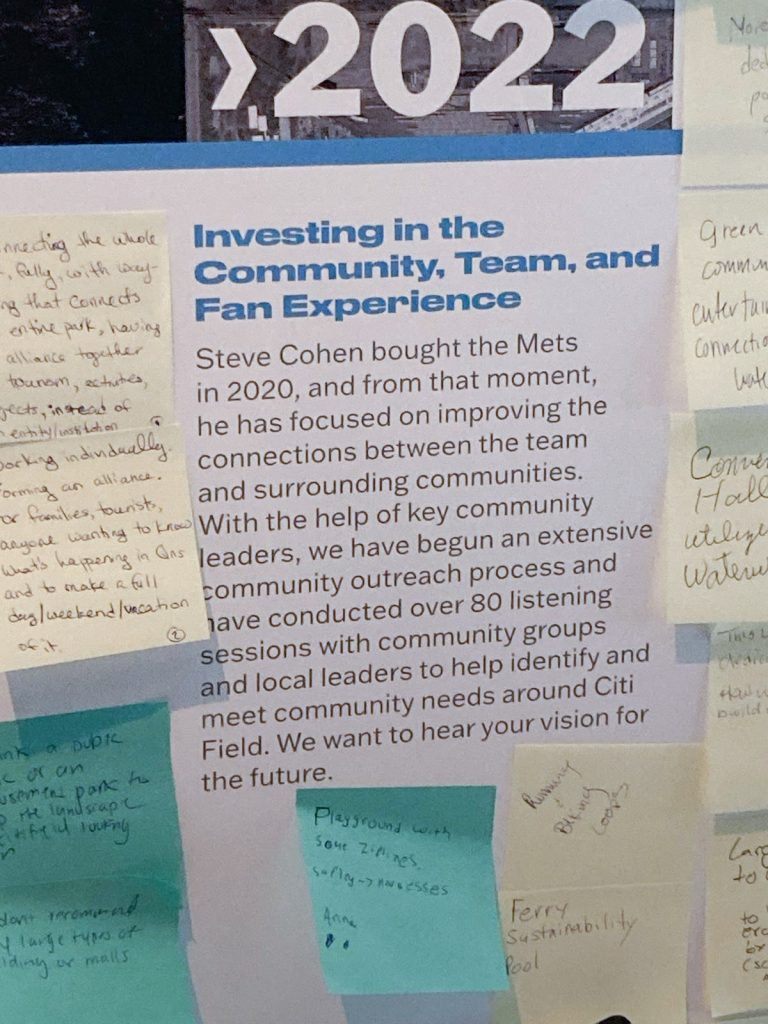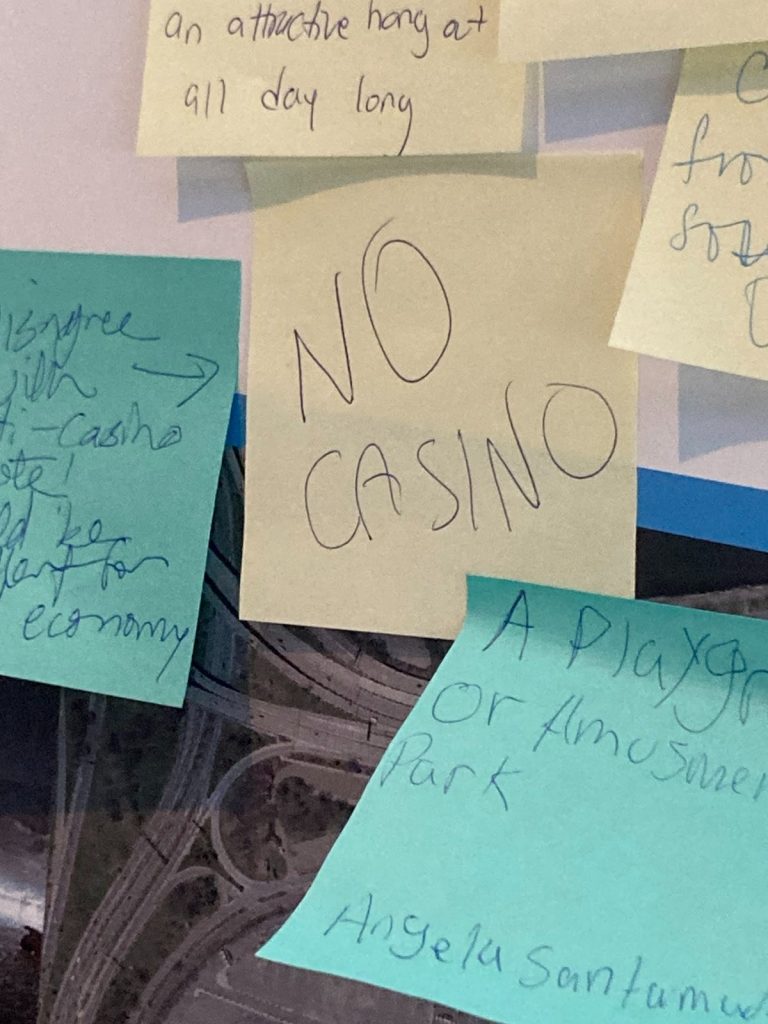Mets owner Steven Cohen really wants to build a casino in Queens.
To make his dream a reality, he has launched a multi-million dollar campaign to sway Queens elected officials, the city, and the state into letting him build the casino on a 50-acre city-owned parking lot next to Citi Field which is legally registered as public parkland.
But a growing coalition of immigrant-led community, civic and environmental groups have vowed to stop the plan. As of yet, there is no exact time frame for when the project will be approved.
Also Read: Despite Dozens of Safety Violations, the Construction of a Multimillion Tower Continues in Queens
In their view, a casino on top of public parkland would not only cause environmental issues for communities, such as an increase in flooding and an increase in car traffic for a community already in need of public green space, but it would also prey on vulnerable immigrants when building its customer base.
“A casino in Citi Field is surrounded by immigrant communities and Cohen and his team are specifically targeting our communities like Flushing, a heavily Asian community,” said Sarah Ahn, an organizer with the Fed Up Coalition, a group opposed to the casino. “He is targeting the Asian community who will be spending the money at the casino and we know this means they will be losing their hard-earned money.”
A 2021 report by Asian CARES, a coalition of ethnic-based community organizations in Boston, found that casinos target their advertising toward Asian communities and their immigrant population, often exploiting their poverty and social isolation. Casinos have particularly marketed to older Asian community members who are often the most vulnerable.
Currently, Resorts World Casino, the only gaming facility operating in five boroughs, has Chinese language advertisements plastered throughout Queens. Resorts World also hired a Director of Asian Marketing and has hosted Chinese-themed events. Foxwoods and Mohegan Sun, two casinos located in nearby Connecticut, both have a large Asian customer base and also have Asian marketing departments.
With only three downstate gambling licenses up for grabs, Cohen has made his sites’ proximity to Queens’ large Asian community a selling point. However, Rebecca Pryor, executive director of the Guardians of Flushing Bay, said that a casino would only exacerbate environmental concerns in a community plagued by flooding.
“We need transparently planned, community-generated neighborhood projects that absorb rainfall, reduce air pollution, protect our public parkland and prioritize — rather than prey upon — our environmental justice communities,” she said.
In January, Cohen, whose hedge fund company pled guilty to fraud in 2013, hosted a lavish community “visioning” session at Citi Field to help him reimagine the future of the stadium’s dreary 50-acre parking lot. Mingling amongst the collection of the clergy, electeds, and business leaders, Cohen circled the room with a posse of bodyguards standing close by and posed with guests eager to snap a picture with him.
Several poster boards were scattered across the stadium’s exclusive Piazza 31 Club, encouraging a hodgepodge of invited community leaders and stakeholders to write down their ideas about the future of the site on sticky notes as they enjoyed a complimentary buffet of hot dogs, pretzels, and sodas.
Yet no mention was made of a casino, as poster boards displayed vague mentions of “gaming.” Most who participated wrote down that the space should be used for parkland, recreation, or community space. A few of the sticky notes bluntly stated they opposed a casino.

The January event was just one of the 15 community workshops Cohen organized to win over the public to support his plan. Outreach teams have also been dispatched across the borough, polling 600 residents about the future of the site. A Cohen-funded poll found that 78 percent of residents were generally supportive of a plan that would include dining, hotels, live music, community space, athletic facilities, waterfront access, public transportation improvements, new jobs, and a casino.
Still, Cohen would ultimately need the State Legislature to pass a bill approving the development of the parkland site. State law requires that any municipality that wishes to develop on public parkland must be authorized by legislation enacted by the New York State Legislature and approved by the Governor. Any parkland that has been “alienated” must be replaced with equivalent parkland.

The site was originally used as a parking lot for guests attending the World’s Fair and has remained a parking lot ever since. A 2008 attempt by the Mets to build a megamall on the parking lot was squashed after state courts ruled that the Mets could not develop the land without first seeking state approval.
To ensure that his plan doesn’t meet the same fate, Cohen’s group, New Green Willets, has hired eight lobbying firms to help influence city and state officials. According to state records, Cohen spent $730,306 on lobbying efforts this year alone.
Among the lobbying firms retained by Cohen is Hollis Public Affairs which employs two notable lobbyists, Julissa Ferreras-Copeland and Tarik Coles. Ferreras-Copeland is the former City Councilmember of the district between 2009 to 2017 whose council vote was instrumental in the rezoning of neighboring Willets Point, which led to the displacement of many immigrant-owned auto body shops. As a councilmember, she also supported the previous attempt to build a mall on the parking lot in 2017.
The three key elected officials essential for Cohen to win over are Assembly Member Jeffrion Aubry, Senator Jessica Ramos, and NYC Council Member Francisco Moya, whose districts overlap with each other. Coles is the former chief of staff to New York State Senator Jessica Ramos.
In March, Aubry introduced legislation that would allow Cohen to lease the land for his casino project, but for the bill to become law, similar legislation would have to be introduced by Ramos in the Senate.
Aubry’s bill would effectively trade the publicly owned parking lot to New Green Willets in return for yet-to-be-determined park improvements. While New York State calls for an “acre-to-acre” replacement when taking public parkland, the bill would allow for an “acre-to-equivalent-land-value” replacement, meaning that parkland would not necessarily be replaced.
However, Aubry’s bill can’t become law without support from Ramos. An avid Mets fan, Ramos had been vocal about her opposition to Cohen’s purchase of the franchise due to his shady past. Yet sources in Albany have told Documented that, as of late, the Senator might be supportive of the plan.
To the surprise of many, after a crowded May 19 town hall event in Corona hosted by Ramos, the Senator abruptly declined to introduce any bill in support of developing the site this legislative session. Instead, she expressed her desire to hold more community conversations.
“The only thing that can sway me is more conversation with my neighbors,” Ramos told City & State. “If the majority of my neighbors were to come to me when we’re having these community conversations and tell me that that’s what they want, then we are having a different conversation, but that’s not the conversation that has happened.”
Neither Aubry nor Moya responded to Documented’s request for comment. Cohen’s group New Green Willets also did not respond.
Although Ahn of the Fed Up Coalition was happy that Ramos delayed supporting the project in favor of hosting more public meetings, she hopes that the senator, as well as other elected officials, work with the community to develop an alternative plan that would be less harmful than a casino and centers the community’s needs.
“We want to make clear, though, that we want our public parks to be protected and improved upon for everyone to enjoy and benefit from, even bringing economic opportunities to our communities,” she said. “No amount of burying the casino under ‘community benefits’ makes the casino any less harmful to our communities. We urge Senator Ramos and all our elected officials to work with the community to make this a reality instead of enabling Steve Cohen’s Citi Field casino.”





